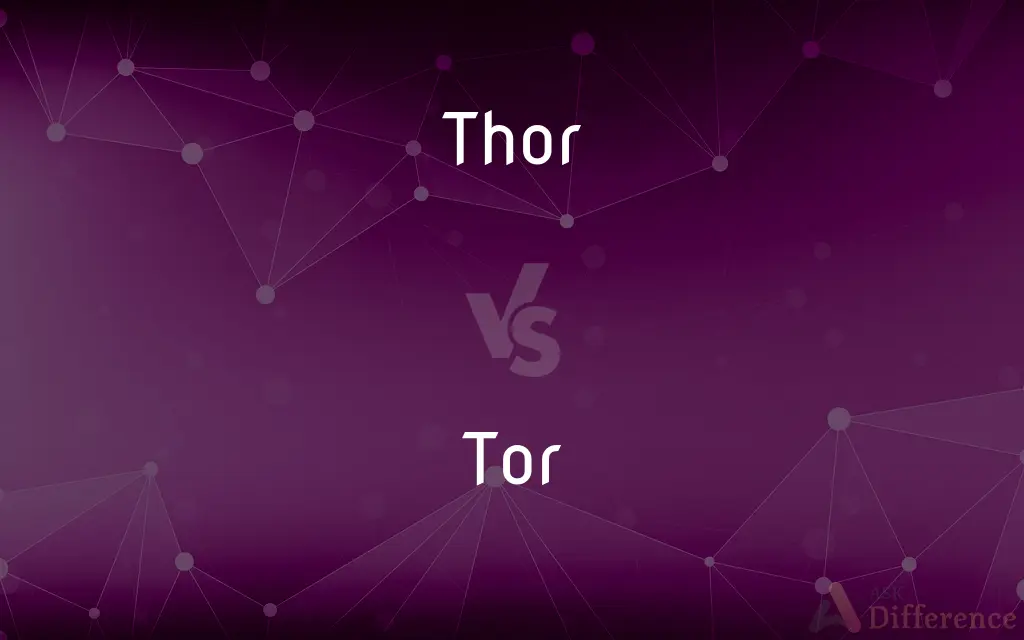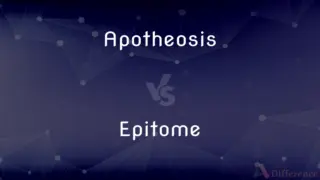Thor vs. Tor — What's the Difference?
By Tayyaba Rehman & Fiza Rafique — Updated on April 22, 2024
Thor is mythological Norse god associated with thunder, lightning, and strength, featured prominently in mythology and popular culture. Tor is free and open-source software for enabling anonymous communication, focusing on protecting users' privacy.

Difference Between Thor and Tor
Table of Contents
ADVERTISEMENT
Key Differences
Thor, in Norse mythology, is known for his immense strength, his control over thunder and lightning, and his role as a protector of humanity. Whereas Tor, short for The Onion Router, is a technology designed to anonymize user activity and communication on the internet, ensuring privacy and security.
Thor wields Mjölnir, a magical hammer that symbolizes his power and authority, used in numerous myths to battle giants and other threats. In contrast, Tor utilizes a complex network of volunteer-operated servers to route internet traffic through multiple layers of encryption, resembling the layers of an onion, hence the name.
Thor is often depicted as a formidable, red-bearded warrior in mythology and has been adapted into various forms of media, notably comic books and movies, becoming a popular cultural icon. On the other hand, Tor represents a tool in the digital age, essential for users who prioritize privacy, such as journalists, activists, and those in restrictive countries.
The legends of Thor include tales of heroism and adventure, deeply embedded in Norse culture and religion, often teaching lessons about bravery and virtue. Meanwhile, Tor was developed with the intention of promoting free speech and privacy on the internet, providing a means to resist censorship and surveillance.
Thor is celebrated in many festivals and his influence is seen in modern-day names of the weekday Thursday ("Thor's day"). Tor, although less likely to be celebrated in a traditional sense, is recognized in the realms of technology and cybersecurity, gaining appreciation from those who advocate for internet freedom and security.
ADVERTISEMENT
Comparison Chart
Nature
Mythological deity
Software technology
Purpose
God of thunder, protection
Anonymity and privacy on the internet
Symbol
Hammer (Mjölnir)
Onion (layers of encryption)
Cultural Impact
Featured in myths, media, and folklore
Used in cybersecurity and privacy advocacy
Primary Users
Worshipers, readers, movie-goers
Journalists, activists, privacy-conscious individuals
Compare with Definitions
Thor
A Norse god associated with thunder, lightning, and protection.
Thor is often depicted wielding his mighty hammer, Mjölnir.
Tor
Known for its "onion routing" process.
Tor encrypts user data in multiple layers, similar to the layers of an onion.
Thor
Adapted into popular culture through comics and films.
Thor has become widely recognized through his portrayal in superhero movies.
Tor
A free software that enables anonymous communication.
Tor is widely used by those needing to mask their internet activity.
Thor
A central character in mythology and folklore.
Stories of Thor often involve battles with giants and other mythical creatures.
Tor
Designed to protect users’ privacy and freedom online.
Activists use Tor to evade surveillance in oppressive regimes.
Thor
Symbolized by his hammer, which represents power and authority.
Mjölnir, Thor’s hammer, is a key icon in Norse symbols.
Tor
Supports initiatives against internet censorship.
Tor provides access to blocked websites in various countries.
Thor
Celebrated in aspects of modern culture, such as the naming of Thursday.
Thursday is named after Thor, reflecting his enduring cultural significance.
Tor
Utilizes a volunteer-operated server network.
Internet traffic through Tor is relayed and encrypted multiple times for security.
Thor
In Germanic mythology, Thor (; from Old Norse: Þórr) is a hammer-wielding god associated with lightning, thunder, storms, sacred groves and trees, strength, the protection of mankind and also hallowing and fertility. Besides Old Norse Þórr, the deity occurs in Old English as Þunor, in Old Frisian as Thuner, in Old Saxon as Thunar, and in Old High German as Donar, all ultimately stemming from the Proto-Germanic theonym *Þun(a)raz, meaning 'Thunder'.
Tor
A high rock or pile of rocks on the top of a hill.
Thor
The god of thunder.
Tor
A rocky peak or hill.
Thor
(Geordie) there
Tor
(geology) A craggy outcrop of rock on the summit of a hill, created by the erosion and weathering of rock.
Thor
(Geordie) they're (they are)
Tor
(South-West England) A hill with such rock formation.
Thor
(Geordie) their
Tor
A tower; a turret.
Thor
The god of thunder, and son of Odin.
Tor
High-pointed hill; a rocky pinnacle.
A rolling range of dreary moors, unbroken by tor or tree.
Thor
(Norse mythology) god of thunder and rain and farming; pictured as wielding a hammer emblematic of the thunderbolt; identified with Teutonic Donar
Tor
A prominent rock or pile of rocks on a hill
Tor
A high rocky hill
Common Curiosities
What is the main purpose of Tor?
The main purpose of Tor is to enable anonymous communication and protect online privacy.
How does Tor ensure user anonymity?
Tor uses layered encryption and randomized routing through volunteer-operated servers.
Who is Thor in Norse mythology?
Thor is the Norse god of thunder, known for his strength and protection.
Who benefits from using Tor?
Journalists, activists, and anyone needing to safeguard their identity online benefit from using Tor.
What are typical uses of Tor?
Tor is typically used for secure browsing, accessing blocked content, and maintaining privacy.
Are there any festivals dedicated to Thor?
While not specific festivals, Thor’s influence is seen in many cultural celebrations of Norse heritage.
Can Thor be considered a cultural hero?
Yes, Thor is regarded as a cultural hero in Norse mythology and modern popular culture.
How does Tor handle data security?
Tor secures data by encrypting it multiple times as it passes through different relays.
Is Thor associated with any particular day of the week?
Yes, Thursday is named after Thor.
What symbol is most associated with Thor?
The hammer, Mjölnir, is the most iconic symbol associated with Thor.
What makes Tor different from typical web browsers?
Unlike typical browsers, Tor anonymizes user activity, making it difficult to trace internet usage back to the user.
How is Thor depicted in popular culture?
In popular culture, Thor is often depicted as a powerful, heroic figure with a magical hammer.
Why is privacy important for Tor users?
Privacy is crucial for protecting against surveillance, censorship, and identity theft.
Can Thor be worshipped today?
Yes, Thor is worshipped by followers of modern Heathenry and other Norse revivalist movements.
Does Thor have any specific enemies?
Thor’s traditional enemies include giants and various monsters in Norse myths.
Share Your Discovery

Previous Comparison
Wee vs. Little
Next Comparison
Apotheosis vs. EpitomeAuthor Spotlight
Written by
Tayyaba RehmanTayyaba Rehman is a distinguished writer, currently serving as a primary contributor to askdifference.com. As a researcher in semantics and etymology, Tayyaba's passion for the complexity of languages and their distinctions has found a perfect home on the platform. Tayyaba delves into the intricacies of language, distinguishing between commonly confused words and phrases, thereby providing clarity for readers worldwide.
Co-written by
Fiza RafiqueFiza Rafique is a skilled content writer at AskDifference.com, where she meticulously refines and enhances written pieces. Drawing from her vast editorial expertise, Fiza ensures clarity, accuracy, and precision in every article. Passionate about language, she continually seeks to elevate the quality of content for readers worldwide.














































